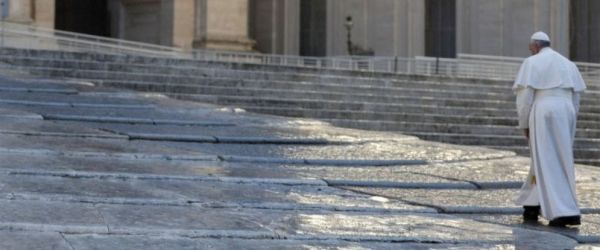This Sunday’s Gospel passage (cf. Lk 6:27-38) concerns a central point that characterizes Christian life: love for enemies. Jesus’ words are clear: “I say to you that hear, Love your enemies, do good to those who hate you, bless those who curse you, pray for those who abuse you” (vv. 27-38). And this is not optional, it is a command. It is not for everyone, but for the disciples, whom Jesus calls “you that hear”. He is well aware that loving enemies exceeds our possibilities, but this is why he became man: not to leave us as we are, but to transform us into men and women capable of a greater love, that of his Father and ours. This is the love that Jesus gives to those who ‘hear him’. Thus it becomes possible! With him, thanks to his love, to his Spirit, we are able to love even those who do not love us, even those who do us harm.
In this way, Jesus wants God’s love to triumph over hatred and rancour in every heart. The logic of love, which culminates in Christ’s Cross, is a Christian’s badge and induces us to meet everyone with the heart of brothers and sisters. But how is it possible to overcome human instinct and the worldly law of retaliation? Jesus provides the answer in the same Gospel passage: “Be merciful, even as your Father is merciful” (v. 36). Those who hear Jesus, who make an effort to follow him even at a cost, become children of God, and begin to truly resemble the Father who is in heaven. We become capable of things we never thought we could say or do, and of which we would have been rather ashamed, but which now give us joy and peace instead. We no longer need to be violent, with words and gestures: we discover that we are capable of tenderness and goodness; and we sense that all of this comes not from ourselves but from him! And thus we do not brag about it but are grateful for it.
There is nothing greater and more fruitful than love: it bestows all dignity to the person, while, on the contrary, hatred and vengeance decrease it, marring the beauty of the creature made in God’s image.
This command, to respond to insult and wrongdoing with love, has created a new culture in the world: “a culture of mercy” — we need to learn this well! And properly practice this culture of mercy — which “can set in motion a real cultural revolution” (Apostolic Letter Misericordia et Misera, 20). It is the revolution of love, in which the protagonists are the martyrs of all times. And Jesus assures us that our behaviour, inspired by love for those who do us harm, will not be in vain. He tells us: “forgive, and you will be forgiven; give, and it will be given to you” (vv. 37-38). This is beautiful. God will give us something beautiful if we are generous, merciful. We must forgive because God has forgiven us and always forgives us. If we do not forgive completely, we cannot expect to be forgiven completely. However, if our hearts are open to mercy, if we seal forgiveness with a brotherly embrace and secure the bonds of communion, we proclaim to the world that it is possible to overcome evil with good. At times it is easier for us to remember the harm they have done to us and not the good things; to the point that there are people who have this habit and it becomes a sickness. They are “collectors of injustice”: they only remember the bad things done. And this is not a path. We must do the opposite, Jesus says. Remember the good things, and when someone comes with some gossip, and speaks ill of another, say: “Yes, perhaps ... but he has this good quality...”. Turn the discussion around. This is the revolution of mercy.
May the Virgin Mary help us to let our heart be touched by this holy word of Jesus, burning like fire, that it may transform us and make us able to do good without reciprocation, doing good without reciprocation, witnessing everywhere to the victory of love.
[Pope Francis, Angelus 24 February 2019]












